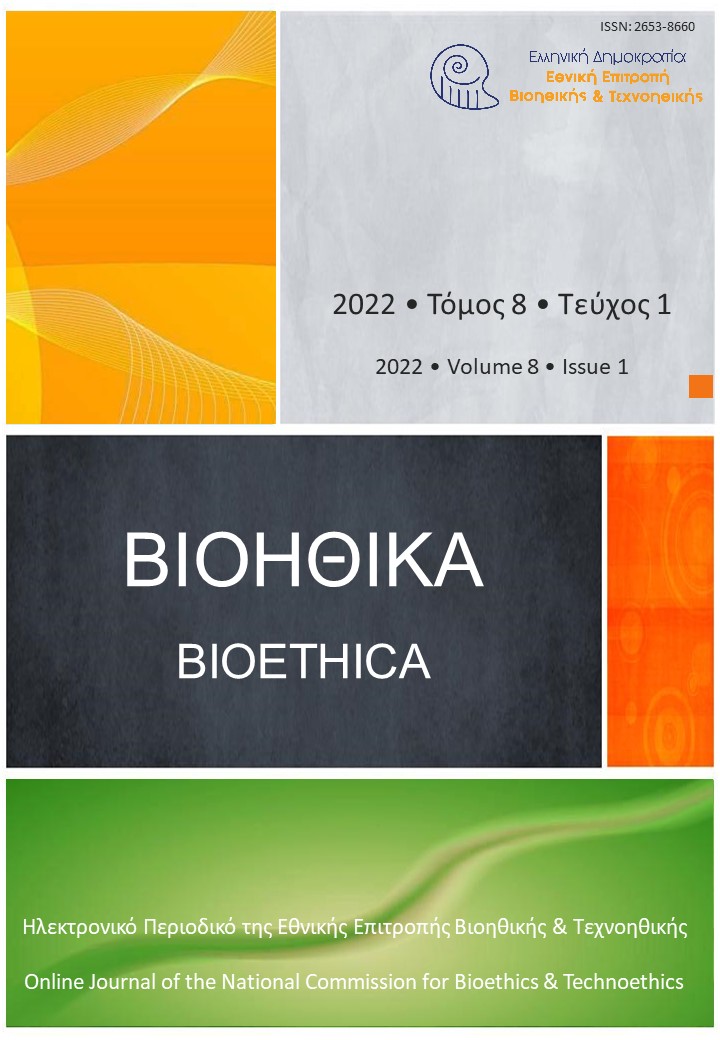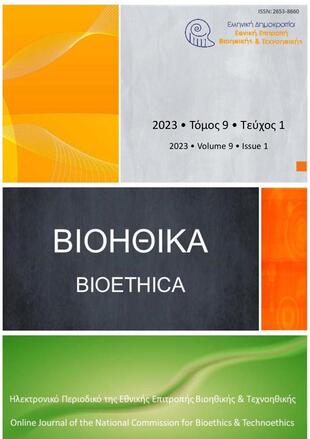Ζητήματα σχετικά με το τέλος της ζωής σε ενήλικες – Ευθανασία

Περίληψη
Η παρούσα εργασία εκπονήθηκε στο πλαίσιο των εκπαιδευτικών Σεμιναρίων με θέμα «Σύγχρονα Θέματα Βιοηθικής» - Δ’ Κύκλος (Φεβρουάριος – Μάιος 2021) που διοργανώθηκε από την Εθνική Επιτροπή Βιοηθικής και Τεχνοηθικής και το Εργαστήριο Μελέτης Ιατρικού Δικαίου της Νομικής Σχολής του Αριστοτελείου Πανεπιστημίου Θεσσαλονίκης. Θέμα της μελέτης είναι τα ζητήματα που σχετίζονται με το τέλος της ζωής σε ενήλικες και η ευθανασία, ένα θέμα διαχρονικό που επηρεάζει τη σκέψη επιστημόνων διαφόρων κλάδων, για αυτό συνεργαστήκαμε επιστήμονες από διαφορετικούς κλάδους επιχειρώντας να αναλύσει ο καθένας από μας πώς αντιμετωπίζονται τα ζητήματα σχετικά με το τέλος της ζωής από την πλευρά της επιστήμης του. Στόχος της μελέτης είναι ακριβώς μέσω αυτής της διεπιστημονικότητας να αναλυθούν σφαιρικά και όσο το δυνατόν πιο λεπτομερώς τα ζητήματα σχετικά με το τέλος της ζωής και να παρουσιαστούν ορισμένα συμπεράσματα. Αρχικά, παρατίθενται τα ηθικά ζητήματα που εγείρονται σχετικά με την ευθανασία, ενώ στη συνέχεια υπογραμμίζεται η θέση των διαφόρων θρησκειών σχετικά με τα ζητήματα για το τέλος της ζωής. Εν συνεχεία, επιχειρείται η
αναζήτηση της ύπαρξης ή μη ενός δικαιώματος στο θάνατο, η νομική οριοθέτηση των ζητημάτων αυτών με έμφαση στην ευθανασία, αλλά και η νομολογιακή επισκόπηση, κυρίως των αποφάσεων του Ευρωπαϊκού Δικαστηρίου Δικαιωμάτων του Ανθρώπου (ΕΔΔΑ). Στο τέλος, η παρούσα μελέτη αναφέρεται στον τρόπο με τον οποίο η ιατροδικαστική επιστήμη αντιμετωπίζει το τέλος της ζωής.
Λεπτομέρειες άρθρου
- Πώς να δημιουργήσετε Αναφορές
-
Βασιλειάδης Γ., Ζαχαρόπουλος π. Δ., Κούση Χ., & Τζερμπίνου Α. (2022). Ζητήματα σχετικά με το τέλος της ζωής σε ενήλικες – Ευθανασία. Βιοηθικά, 8(1), 22–34. https://doi.org/10.12681/bioeth.30534
- Ενότητα
- Πρωτότυπες Εργασίες

Αυτή η εργασία είναι αδειοδοτημένη υπό το CC Αναφορά Δημιουργού 4.0.
Οι Συγγραφείς που δημοσιεύουν εργασίες τους σε αυτό το περιοδικό συμφωνούν στους παρακάτω όρους:
- Οι Συγγραφείς διατηρούν τα Πνευματικά Δικαιώματα και χορηγούν στο περιοδικό το δικαίωμα της πρώτης δημοσίευσης, ενώ ταυτόχρονα τα πνευματικά δικαιώματα της εργασίας προστατεύονται σύμφωνα με την Creative Commons Attribution CC BY 4.0, που επιτρέπει άμεση πρόσβαση στις εργασίες και κάθε χρήστη να διαβάζει, να κάνει λήψη, να αντιγράφει, να διανέμει, να εκτυπώνει, να αναζητά, ή να συνδέει με το πλήρες περιεχόμενο των άρθρων, να τα αναζητά για ευρετηρίαση, να τα χρησιμοποιεί ως δεδομένα σε λογισμικό, ή να τα χρησιμοποιεί για οποιοδήποτε άλλο νόμιμο σκοπό. Προϋπόθεση ε΄ιναι η αναφορά στον αρχικό δημιουργό/ούς και την αρχική δημοσίευση σε αυτό το περιοδικό.
- Οι Συγγραφείς μπορούν να συνάπτουν ξεχωριστές, και πρόσθετες συμβάσεις και συμφωνίες για την μη αποκλειστική διανομή της εργασίας όπως δημοσιεύτηκε στο περιοδικό αυτό (π.χ. κατάθεση σε ένα ακαδημαϊκό καταθετήριο ή δημοσίευση σε ένα βιβλίο), με την προϋπόθεση της αναγνώρισης και την αναφοράς της πρώτης δημοσίευσης σε αυτό το περιοδικό.
Το περιοδικό Βιοηθικά επιτρέπει και ενθαρρύνει τους συγγραφείς να καταθέτουν τα δημοσιευμένα άρθρα σε θεσμικά (π.χ. το αποθετήριο του Εθνικού Κέντρου Τεκμηρίωσης) ή θεματικά αποθετήρια (π.χ. αποθετήριο SSOAR για τις Κοινωνικές Επιστήμες), μετά τη δημοσίευσή τους στο περιοδικό «Βιοηθικά» και με όρους Ανοικτής Πρόσβασης, όπως κατά περίπτωση προσδιορίζονται από τους χρηματοδότες της έρευνάς τους ή/και τα ιδρύματα με τα οποία συνεργάζονται.
Κατά την κατάθεση της εργασίας τους, οι συγγραφείς πρέπει να παρέχουν πληροφορίες σχετικά με τη δημοσίευση του άρθρου στο περιοδικό «Βιοηθικά» και τις πηγές χρηματοδότησης της έρευνάς τους.
Κατάλογοι των ιδρυματικών και θεματικών αποθετηρίων ανά χώρα υπάρχουν στη βάση http://opendoar.org/countrylist.php . Οι συγγραφείς έχουν τη δυνατότητα να καταθέσουν χωρίς κόστος την εργασία τους στο αποθετήριο www.zenodo.org, το οποίο υποστηρίζεται από το OpenAIRE (www.openaire.eu ), στο πλαίσιο των πολιτικών της Ευρωπαϊκής Επιτροπής για την ενίσχυση της Ανοικτής ακαδημαϊκής έρευνας.



